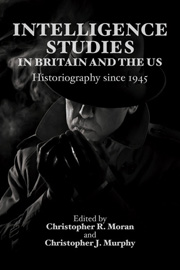Book contents
- Frontmatter
- Contents
- The Editors
- The Contributors
- List of Figures
- Preface
- Acknowledgements
- Introduction: Intelligence Studies Now and Then
- Part I AMERICAN INTELLIGENCE HISTORIOGRAPHY
- 1 CIA History as a Cold War Battleground: The Forgotten First Wave of Agency Narratives
- 2 The Culture of Funding Culture: The CIA and the Congress for Cultural Freedom
- 3 ‘Real Substance, Not Just Symbolism’? The CIA and the Representation of Covert Operations in the Foreign Relations of the United States Series
- 4 Bonum Ex Malo: The Value of Legacy of Ashes in Teaching CIA History
- 5 Narrating Covert Action: The CIA, Historiography and the Cold War
- 6 FBI Historiography: From Leader to Organisation
- 7 Reconceiving Realism: Intelligence Historians and the Fact/Fiction Dichotomy
- 8 The Reality is Stranger than Fiction: Anglo-American Intelligence Cooperation from World War II through the Cold War
- Part II BRITISH INTELLIGENCE HISTORIOGRAPHY
- Index
7 - Reconceiving Realism: Intelligence Historians and the Fact/Fiction Dichotomy
from Part I - AMERICAN INTELLIGENCE HISTORIOGRAPHY
Published online by Cambridge University Press: 05 October 2013
- Frontmatter
- Contents
- The Editors
- The Contributors
- List of Figures
- Preface
- Acknowledgements
- Introduction: Intelligence Studies Now and Then
- Part I AMERICAN INTELLIGENCE HISTORIOGRAPHY
- 1 CIA History as a Cold War Battleground: The Forgotten First Wave of Agency Narratives
- 2 The Culture of Funding Culture: The CIA and the Congress for Cultural Freedom
- 3 ‘Real Substance, Not Just Symbolism’? The CIA and the Representation of Covert Operations in the Foreign Relations of the United States Series
- 4 Bonum Ex Malo: The Value of Legacy of Ashes in Teaching CIA History
- 5 Narrating Covert Action: The CIA, Historiography and the Cold War
- 6 FBI Historiography: From Leader to Organisation
- 7 Reconceiving Realism: Intelligence Historians and the Fact/Fiction Dichotomy
- 8 The Reality is Stranger than Fiction: Anglo-American Intelligence Cooperation from World War II through the Cold War
- Part II BRITISH INTELLIGENCE HISTORIOGRAPHY
- Index
Summary
If official secrecy had a devastating impact on American history, its impact on Americans' understanding of that history was a collateral disaster.
The academic study of intelligence has long established itself in opposition to spy fiction. In Christopher Andrew and David Dilks' seminal introduction to The Missing Dimension, they argued that the lurid embellishments and gross inaccuracies of novelists, journalists and filmmakers had dissuaded professional historians from undertaking a serious study of intelligence history:
The treatment of intelligence by both mass media and publishers often seems ideally calculated to persuade the academic world that it is no subject for scholars … Alexander Dumas once said of a woefully inaccurate history of the French Revolution that it had ‘raised history to the level of a novel’. Many writers on intelligence have achieved the same feat. But historians have been far more put off the subject of intelligence than they need have been. One of the purposes of this volume is to show what can be reliably based on existing archives and published source material.
The historical study of intelligence is conceived of here as a response to fiction. Its epistemological foundations rest in its self-defined status as a verifiable authority on the past, with the expressed aim of correcting the factual inaccuracies of popular misconceptions. In this manner, the fact/fiction dichotomy has formed both a methodology and an epistemology for historians of intelligence.
- Type
- Chapter
- Information
- Intelligence Studies in Britain and the USHistoriography since 1945, pp. 146 - 171Publisher: Edinburgh University PressPrint publication year: 2013

